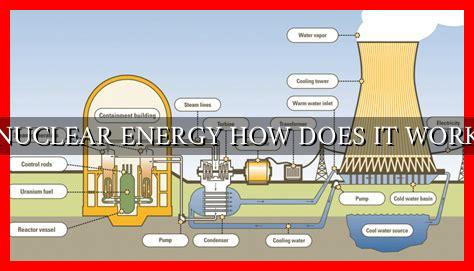-
Table of Contents
NUCLEAR ENERGY: HOW DOES IT WORK
Nuclear energy is a powerful and controversial source of energy that has the potential to provide clean and reliable electricity. Understanding how nuclear energy works is essential to grasp its benefits and risks. In this article, we will explore the process of nuclear energy generation, its advantages, and challenges.
What is Nuclear Energy?
Nuclear energy is the energy released during nuclear reactions, either through fission or fusion processes. Nuclear power plants use nuclear fission, where the nucleus of an atom is split into smaller parts, releasing a large amount of energy. This energy is harnessed to generate electricity through steam turbines.
Nuclear Fission Process
The nuclear fission process begins with the bombardment of uranium-235 or plutonium-239 with neutrons.
. This causes the nucleus to split into two smaller nuclei, releasing additional neutrons and a significant amount of energy in the form of heat. The heat produced is used to convert water into steam, which drives turbines to generate electricity.
Advantages of Nuclear Energy
- Low Greenhouse Gas Emissions: Nuclear energy produces minimal greenhouse gas emissions, making it a cleaner alternative to fossil fuels.
- Reliable Power Generation: Nuclear power plants can operate continuously for long periods, providing a stable source of electricity.
- High Energy Density: Nuclear energy has a high energy density, meaning a small amount of fuel can produce a large amount of energy.
Challenges of Nuclear Energy
- Nuclear Waste Disposal: The disposal of radioactive waste generated by nuclear power plants is a significant challenge due to its long-term environmental impact.
- Safety Concerns: Accidents like the Chernobyl and Fukushima disasters have raised concerns about the safety of nuclear power plants.
- High Initial Costs: The construction of nuclear power plants requires substantial investment, making it a costly energy source.
Case Study: Three Mile Island
In 1979, the Three Mile Island nuclear power plant in Pennsylvania experienced a partial meltdown, leading to the release of radioactive gases. While there were no immediate fatalities, the incident raised concerns about the safety of nuclear power plants and their potential risks.
Future of Nuclear Energy
Despite its challenges, nuclear energy continues to play a significant role in the global energy mix. Advancements in nuclear technology, such as small modular reactors and thorium-based reactors, offer potential solutions to some of the current challenges faced by the industry.
As countries strive to reduce their carbon footprint and transition to cleaner energy sources, nuclear energy remains a viable option for meeting growing energy demands.
Conclusion
In conclusion, nuclear energy is a complex and powerful source of energy that has both advantages and challenges. Understanding how nuclear energy works is crucial to making informed decisions about its use and potential impact on the environment. While nuclear energy can provide clean and reliable electricity, it also poses risks that must be carefully managed. As technology advances, the future of nuclear energy holds promise for addressing its current limitations and contributing to a sustainable energy future.


